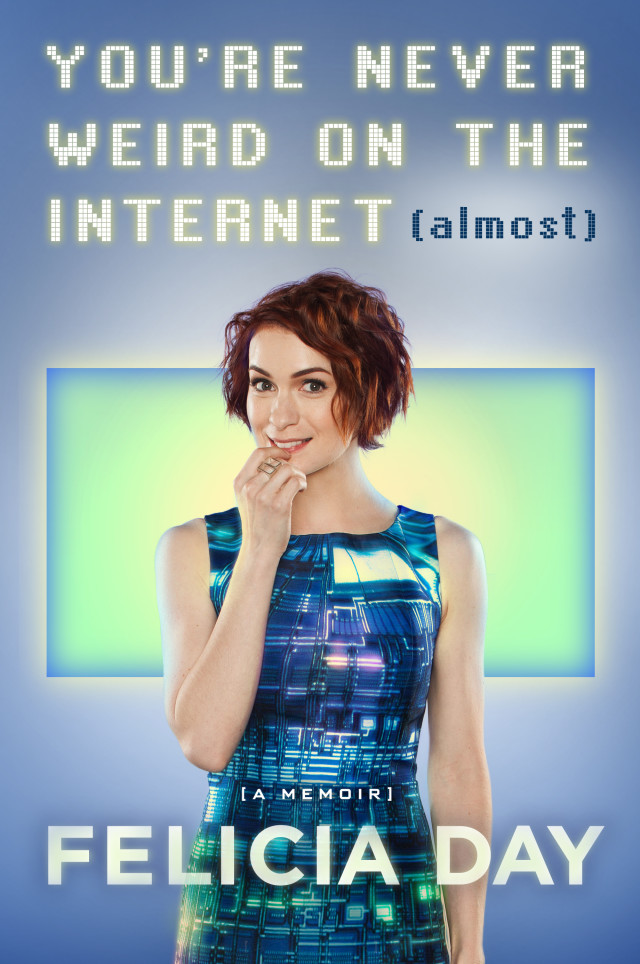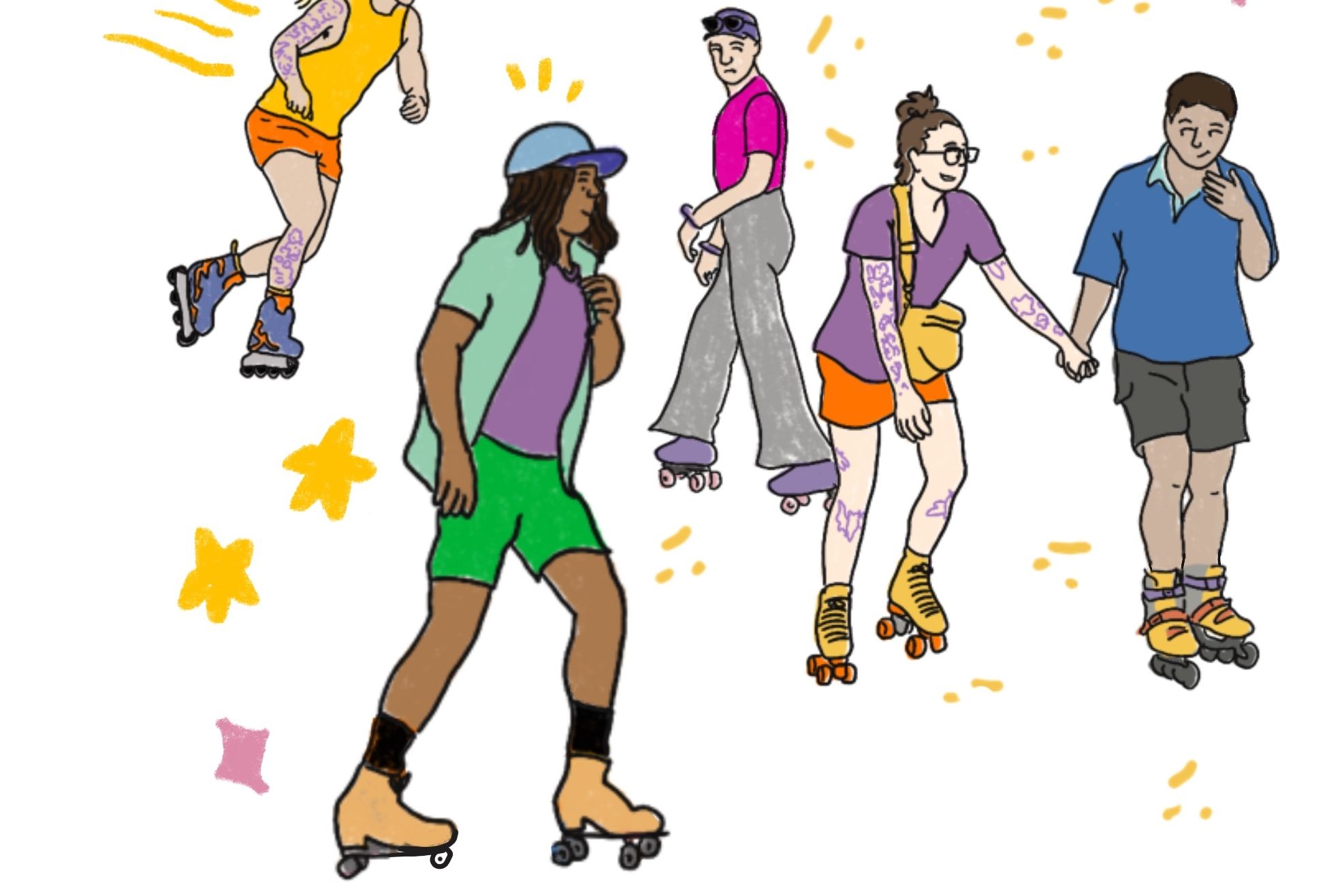From Buffy to Bookstores: Geek Queen Felicia Day's Fantastical Life

She's an actor with shows like Buffy and Supernatural on her resume. She's a reformed gaming addict and a web series writer. Now, after years of blogging and web content creation, Internet darling Felicia Day has her first book on the real-life shelves of a bookstore near you. You're Never Weird On the Internet (Almost) covers Day’s web-centered upbringing, the difficulties she’s encountered in Hollywood and online, and her thoughts on creating community. We caught up with her to hear about geekdom, Gamergate and taking vacations through goggles.
You’ve made a career out of geekdom, and wrote about embracing weirdness in your book—what do those terms mean to you?
Weirdness, to me, is a compliment! Those things that make us stand out are our greatest strengths in life and geekdom allows people to congregate around those weirdnesses. I like to think of geeks as people who love something and love to share that love with other people. Whether you’re into shoes, or comic books, or sports teams, that kind of congregation with other people who let your flag fly is the underpinning of geekdom, and the more you play toward your weirdnesses, the more geeky you are.
You have a remarkable resume in the fantasy genre on television. How did your career as a fantasy actor come about?
Well, I was on Buffy back in 2003 and 2004 through traditional acting and auditioning. I couldn’t have been luckier. It got me into the whole Joss Whedon–verse and showed me that television shows that allow fans to be a part of the show apart from just watching it are very satisfying. That kind of fandom makes a family and makes it mean more to act on a show. I love that sense of community, of a world bringing people together, and I wouldn’t trade acting on a different kind of show for that, ever.
And now the memoir. What compelled you to write it?

I wrote the book based on speeches that I would give around the world to universities, corporations, advertisers, and kids, showing people how I grew up really strange and struggled in Hollywood. The minute I took the reins of my career and started making videos in my garage, I started to really find my stride as a creator. That story of empowerment, of being proud of who you are and teasing destiny, really resonated with people: in accepting themselves or trying something scary in a creative way. I saw the opportunity to turn it into a longer form piece—and scratch a bucket list item off my list.
What first made you see the web as a creative space?
In my book I talk a lot about how my life parallels the emergence of technology. My brother and I, who were homeschooled, looked to very early online services to connect us to the outer world. When YouTube emerged, it was the perfect timing for making videos with my friends and uploading them to find an audience.
It really is a grand democracy of a time to be alive as a creator because you don’t have to go through the traditional avenues to get your story out there. You have the ability to find audience, on some scale, no matter where and who you are. I think that’s really beautiful and something to take advantage of.
The Internet can be a dangerous place, harboring some pretty non-inclusive communities. You were doxxed during Gamergate, so have first hand experience. How do you deal with those kind of attacks?
It’s the dark side of the internet: you allow people to congregate together to embrace who they are, but sometimes that can allow people to feel they can attack people en masse. That was the incident that we saw, particularly last fall. I regret the idea that gaming has been tarnished by a very small minority of people who are very aggressive in their opinions, and all I can do is show the face of gaming that I know, which is an amazing community. I can be as proactive in my positivity as they are proactive in their negativity. (And there are many more positive people!)
You've talked in the past about your addiction to gaming. How did your life change after you cut yourself off from World Of Warcraft?
That was a game I was very addicted to, and I still love it with all my heart. I wouldn’t be here today if I didn’t love that game so much. I just happened to have things in my life that let that hobby get out of control. When I quit cold turkey it was through the support of my friends to find something a little more fulfilling to add to my life in addition to gaming, and thank goodness it was writing, because writing about what I loved and what I knew—gaming online—has brought me to this point.
You’ve been described often as a feminist—do you consider yourself one?
I define feminism as someone who believes in equal rights for women: to be treated equally, represented equally, to have a voice that is 100% equal to anyone else’s. So yes, absolutely. As someone who is in various areas that are traditionally not female, I see a lot of tropes and biases that we all are raised with—even women themselves. Having grown up outside of traditional systems and raised to love mathematics and games and fantasy and science fiction, things that are not traditionally “female,” I see that a lot of things that are imposed upon us—men, women, different races and backgrounds—are just constructs of society that aren’t necessarily true. The more I can represent myself as a person not willing to go away because someone else tells me I should be different, hopefully inspires other people to do the same.
How do you see the Internet changing in the coming years?
I think content delivery is primarily going to be online, regardless of platform. A blog entry, a long-play game, a live stream, a movie—all of those things are equal to a consumer’s attention. A digital media company has to be producing many things on many platforms in many iterations. It’s going to really change how we interact with each other and interact with the world in radical ways: I can see holodecks from Star Trek: The Next Generation being real. I can see people trying on clothes in a virtual mirror. I can see people renting front row tickets to ball games and red carpets. People taking vacations through their goggles! I mean really, our virtual lives are going to equal or supersede our imaginary ones. I hope that I’m cool enough, when I’m old, to still be at the cutting edge! And I don’t know if it’s going to be a WALL-E situation or not, but certainly it could be something that brings us together or divides us.
Do you have any advice for young people navigating the online world?
They need to surround themselves with positivity and block out the negative. Bullying is a huge problem in school, and online people are even more bold in their aggressiveness. I’m an adult who’s been online for decades and I still get my feelings hurt every day when someone sends something to me that no one would ever say to someone in real life. So I think it’s important to be protecting yourself and seeking help if you feel lonely or lost, because those negative people shouldn’t have the reins of your emotions when they don’t have your best interests at heart.
Felicia Day will be at Powell's Books at Cedar Hills Crossing on Monday, August 24.




